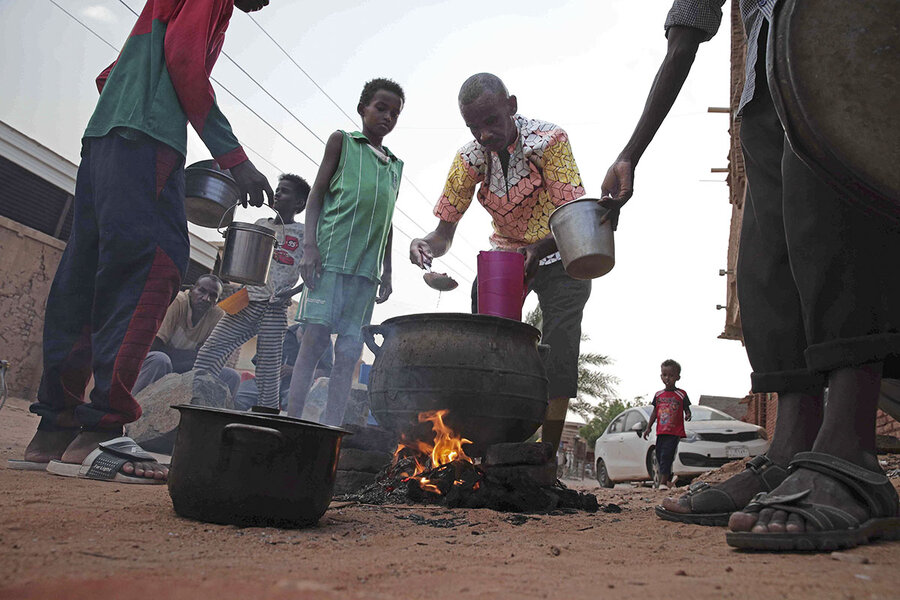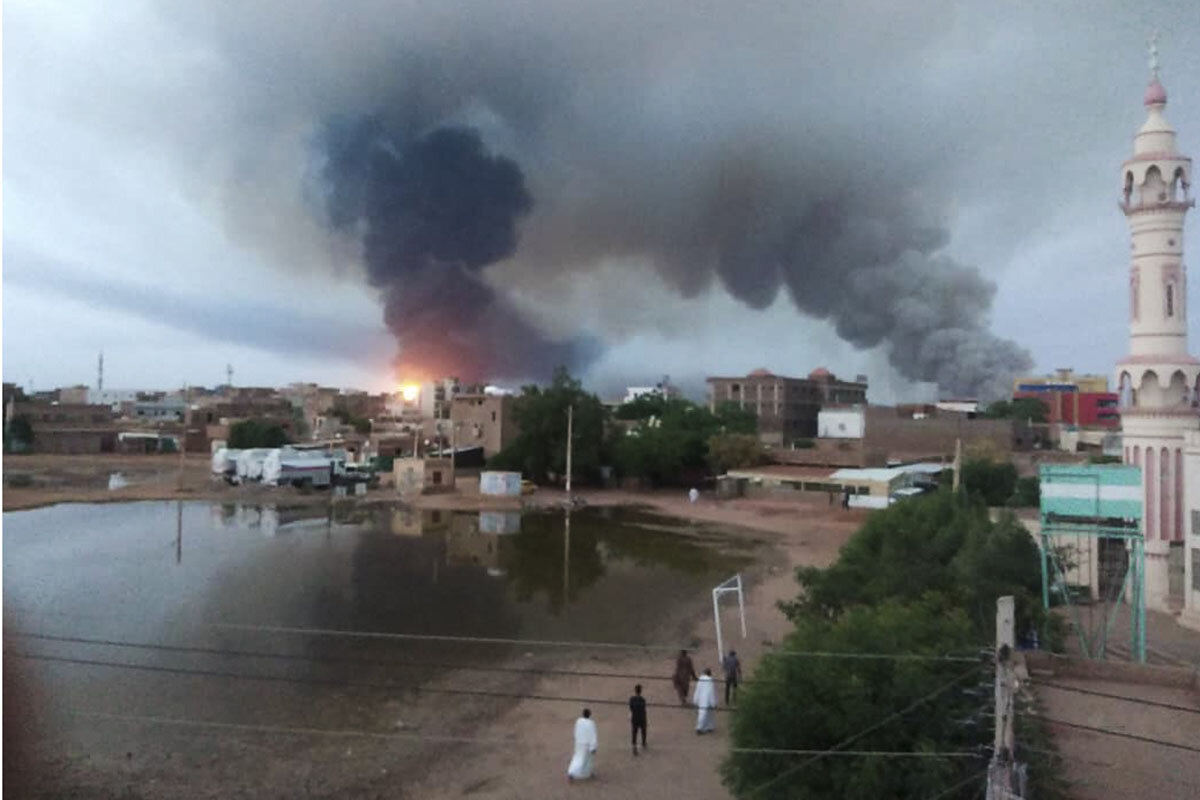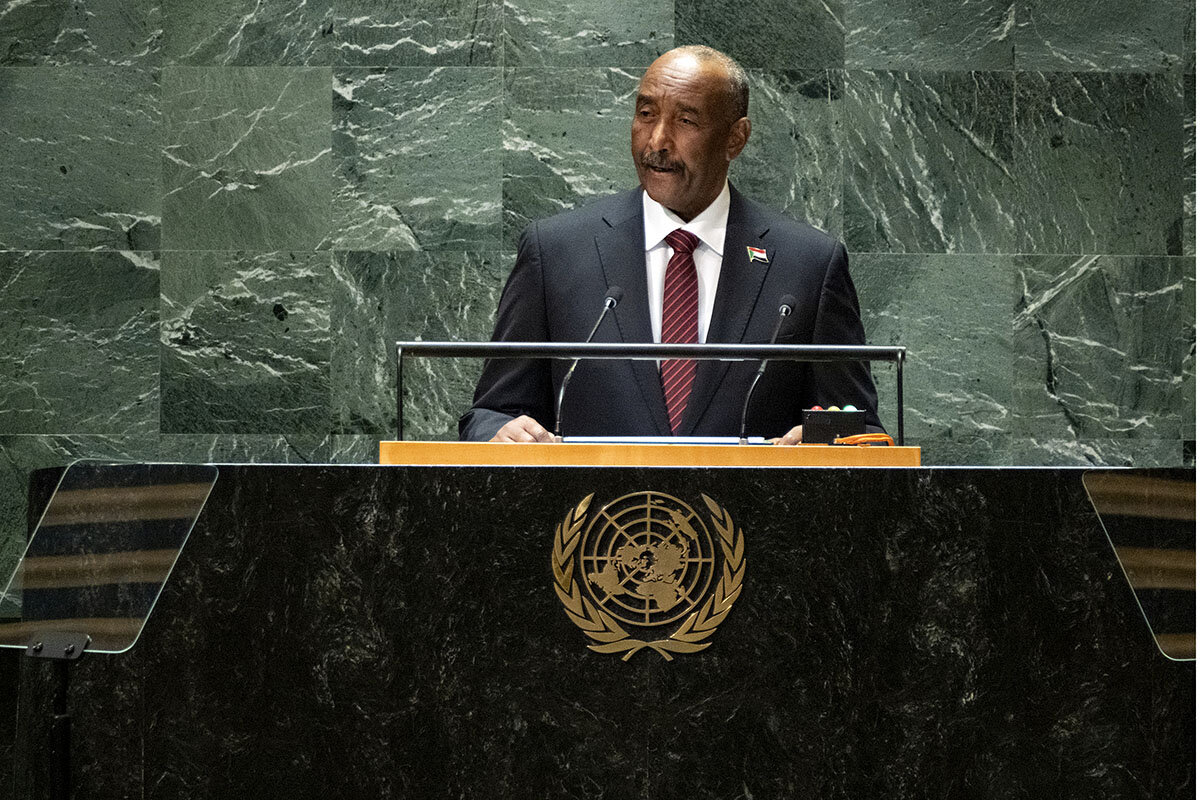Two decades after Darfur, Sudan cries out again. Is anyone listening?
Loading...
| UNITED NATIONS
Torched villages and croplands. Executions of men and boys based on their ethnicity. Sniper fire targeting fleeing civilians. Rampant rape and other forms of sexual violence terrorizing women and girls.
When these atrocities were committed in Sudan two decades ago, an outraged world took notice and took action.
International sanctions were slapped on the Sudanese government. The United States determined that genocide was taking place in Darfur, the western province where the violence was occurring. That designation set in motion a number of actions.
Why We Wrote This
A story focused on“Save Darfur” mobilized the world two decades ago. But amid intense fighting in Sudan that has created a new humanitarian crisis, calls to move from international talk to action have so far not been answered.
An incensed public got in on the act as well. Bumper stickers implored, “Save Darfur.”
Today a similar array and intensity of violence is again striking Sudan, which is entering a sixth month of fighting between the military and a powerful paramilitary force that has its origins in the Darfur conflict.
Some experts maintain that a genocidal campaign has resumed in the state of West Darfur.
And yet this time a different international community – overwhelmed by mounting conflicts and natural disasters, and navigating a distracting rise of big-power competition – seems to be taking only passing notice.
Sudan’s descent garners only sporadic attention, much to the disappointment of humanitarian workers and human rights activists who are pressing for a stronger international response.
“With what we know from our past experience in Darfur, it’s all the more alarming to hear the stories of violence and ethnic cleansing that are so similar to the worst of those bad days,” says Avril Benoît, executive director of Doctors Without Borders USA. “And in some ways this is worse because we’re seeing unrelenting violence in so many parts of the country all at once.”
The problem, she says, is that the sheer number and intensity of conflicts and other disasters around the world are overwhelming the international community and leaving Sudan to stand in line.
“There is such a deluge of crises, from Yemen to ... Haiti, malnutrition across the Sahel, multiplying climate crises, the floods in Libya, and the earthquake in Morocco, that everyone is just overstretched,” she says.
Yet while the world’s attention has been focused elsewhere, a conflict that started in April as a duel between the military chief and a warlord at the head of the Rapid Support Forces paramilitary group has expanded into a civil war.
Harrowing tales
More than 5,000 Sudanese civilians have been killed in the fighting, while 5.5 million have been displaced – at least 1 million of them fleeing across borders. More than 400,000 have streamed into neighboring Chad, already staggering under the impact of drought, Islamist extremism, and political upheaval. Another 300,000-plus have fled to Egypt.
Refugees arrive in Chad’s sprawling, bare-bones refugee camps with bullet wounds and malnourished children – and harrowing tales of massacres, indiscriminate bombardments, and the hasty interring of loved ones in mass graves as villages are systematically destroyed.
Internally, acute food insecurity has spiked, with 6 million people on the precipice of famine, according to relief organizations operating inside Sudan.
Yet even as the fighting has expanded and reports of atrocities committed by both sides have mounted, international efforts to stop the fighting have been meager, experts say.
“There are conversations on what’s going on in Sudan, as we saw [recently] at the U.N. But as people are talking day in and day out, people in Sudan are dying, they’re experiencing really horrendous violence,” says Mike Brand, an adjunct professor of genocide studies and human rights at the University of Connecticut. “There’s just no appetite for the kinds of action and mobilization that we saw in the early 2000s.”
Some countries and organizations have pressed recently for international action to quell the fighting – especially at last month’s opening of the United Nations General Assembly.
The heads of 50 humanitarian and human rights organizations addressed an open letter to the Security Council in the run-up to the mid-September gathering of world leaders, demanding the council “move from talk to action.”
At a Security Council session on Sudan, U.S. Ambassador Linda Thomas-Greenfield painted a picture of dire human suffering and horrific violence targeting civilians based on a recent visit to Sudanese refugee camps in Chad. But no action was taken.
Regional powers
One factor fueling the fighting is the willingness of some regional powers to intervene behind the scenes, primarily by supplying arms to a preferred side in the conflict. Sudan experts say, for example, that the United Arab Emirates is covertly supplying the Rapid Support Forces with an array of weaponry, despite public claims of providing only humanitarian assistance.
The U.S. has joined with Saudi Arabia to organize some talks between the warring parties, but they have gone nowhere. The leader of Sudan’s military and the country’s de facto leader, Abdel Fattah al-Burhan, attended the General Assembly session, where he declared himself ready for peace talks – but also called on the international community to designate the Rapid Support Forces a terrorist organization.
Such conditions have meant no meaningful peace talks, and a slide into civil war in a country that in 2019 was celebrated internationally for its pro-democracy movement and initial steps toward democratic governance.
Yet as the fighting continues, humanitarian organizations report the effects of worsening violence and rising displacements both inside Sudan and in refugee camps where each day more Sudanese seek safety.
“The sheer level of displacement tells you that people are terrified,” says Ms. Benoît of Doctors Without Borders. “The stories we hear also make it clear that people have no idea where to turn for safety.” Recently some of the most intense fighting has been right outside hospitals, she says, making people reluctant to come for care.
Moreover, the Doctors Without Borders staff is reporting an alarming rise in cases of severe malnutrition, especially among children. “What we’re seeing are cases where mothers with several acutely malnourished children only bring in one child because the mother thinks she has a better chance of getting help if she comes with only one,” she says.
Warning of renewed genocide
In June, a group of 94 human rights specialists and Sudan experts – including Mr. Brand from the University of Connecticut – signed an open letter to the international community warning of targeted violence in West Darfur that, if unchecked, could lead to genocide. The letter called particular attention to the region’s Masalit people, a non-Arab Muslim ethnic group.
Three months later, Mr. Brand says he’s convinced the letter’s warning was tragically prescient.
“I believe genocide is occurring, and it’s not just the targeted violence against the Masalit,” he says. “It’s important to use the right terminology at the right time,” he adds, “but it’s also difficult to look at what is taking place and not conclude that it’s an effort to finish the job ... started in Darfur in 2004.”
Still, human rights organizations that have carried out some of the most in-depth investigations into Sudan’s civilian-directed violence are not ready to call it genocide.
“We are investigating; we are gathering the evidence and the experiences of people who fled the places where the worst of the atrocities have been committed, but we’re not yet ready” to issue definitive conclusions, says Jean-Baptiste Gallopin, senior researcher with the crisis and conflict division of Human Rights Watch in Paris.
The organization was one of the first to gather eyewitness testimony from survivors of the wholesale destruction of towns and villages in parts of West Darfur and South Darfur in May and June. Those witnesses recounted harrowing tales of executions of men and boys, gunfire targeting anyone fleeing the violence, including children, and the razing of houses and other buildings.
“Refugees told of a town of about 40,000 people that was destroyed in a day,” says Mr. Gallopin, who was most recently in the conflict zone in August.
Yet while Human Rights Watch has concluded that ethnic cleansing and war crimes have occurred in Sudan’s current conflict, it has shied away from going a step further and issuing a finding of genocide.
Mr. Gallopin notes that the organization never joined other groups in determining that genocide occurred in Darfur two decades ago. He adds, however, that a report expected in the coming weeks will update findings of rights violations in West Darfur and could result in new conclusions about the violence taking place.
In the meantime, Ms. Benoît reports that the violence occurring across Sudan has yet to deter the organization’s Sudanese staff from reporting to work in public hospitals, despite harrowing conditions.
“The staff haven’t been paid for months, and yet they show up every day,” she says. “It’s all the more admirable because of the risks they run to get to work, and then the conditions they face once they’ve made it in.
“Many of them have passports and could leave this behind,” she adds, “but they are determined to serve their fellow Sudanese.”









